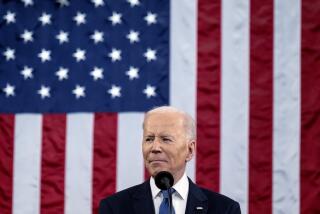Foley Calls for Attack on Crises in the U.S.
- Share via
The dramatic thaw in the Cold War has given the President and Congress an opportunity to attack domestic problems with a vigor that will enable this nation to “march into the future, rather than drift into the future,” House Speaker Thomas S. Foley said Wednesday.
“It is a time for self-congratulation for the United States,” Foley told a general session of the American Newspaper Publishers Assn. convention in Century City, noting that with the recent upheavals in Eastern Europe and the Soviet Union, “American values seem to be triumphing everywhere.”
But at the same time, he said, the United States faces serious problems in education, health care, the mounting national debt and the eroding infrastructure of highways, airports and public sewer systems.
With the burden of military commitment declining, he said, it is time for the nation’s leaders, including the President and top members of Congress, to “dramatically address these issues. . . .”
He cited recent surveys indicating that half of the 17-year-olds in this country cannot read and understand a newspaper editorial. In mathematics, science and geography, he said, American students rank far behind their counterparts in most of the world’s other highly developed nations.
Foley called the country’s health-care systems “increasingly dissatisfying,” despite the fact that more than 11% of the gross national product is expended on them.
In areas where the production of goods and services are declining, Foley said, the nation’s deteriorating infrastructure may be to blame for as much as 80% of the drop. He said that rather than focusing on such nations as Japan when worrying about the trade deficit, “We should be looking at what we can do to improve our own productivity and efficiency.”
During a question-and-answer session that followed his speech at the Shubert Theater, Foley said he agrees with President Bush’s caution in dealing with the escalating dispute between the Soviet government and the rebellious republic of Lithuania.
The congressman said any U.S. attempt to ship oil to the petroleum-starved republic would be thwarted by a Soviet naval blockade, and economic sanctions against the Soviet Union “probably would not be effective. . . .
“I think the President’s approach is right,” Foley said. “He has strong bipartisan support on this issue.”
Later in the day, Defense Secretary Dick Cheney also addressed the ANPA delegates and said he needs “more than words” before he will gain confidence that reforms in the Soviet Union can reduce the threat to the United States.
“The new openness has not yet transformed hope into the reality of a freer government,” Cheney said. “And that reality is what we need to see to allay the fears of the rest of the world about the Soviets’ enormous military power.”
Cheney said it should be recognized that the changes in the Soviet Union occurred because “communism has failed” and that reforms were launched amid “internal crisis and economic collapse.”
Times staff writer Ralph Vartabedian contributed to this story.
More to Read
Get the L.A. Times Politics newsletter
Deeply reported insights into legislation, politics and policy from Sacramento, Washington and beyond. In your inbox twice per week.
You may occasionally receive promotional content from the Los Angeles Times.







